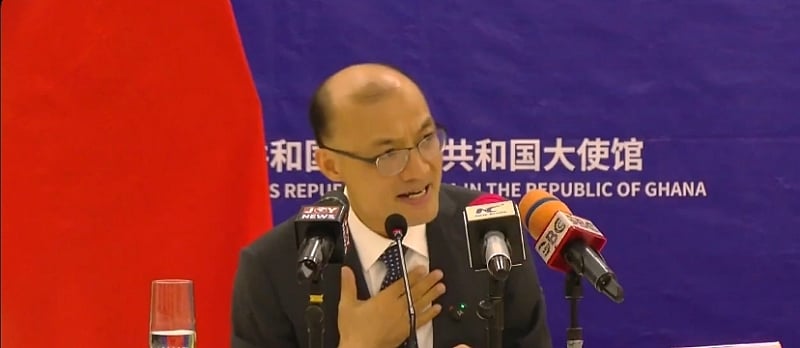The ongoing battle against illegal small-scale mining, commonly known as galamsey, in Ghana has sparked a contentious debate involving accusations against Chinese nationals for their alleged involvement in the destructive practice. His Excellency Tong Defa, the Chinese Ambassador to Ghana, has vehemently refuted these accusations, asserting that it is unjust to blame China and its citizens for a crisis rooted in Ghana’s internal failures. Ambassador Defa argues that the narrative unfairly targets Chinese individuals while overlooking the crucial role of local actors who facilitate and perpetuate illegal mining activities. He emphasizes the need for a shift in Ghana’s national strategy, advocating for comprehensive, long-term policies focused on environmental protection rather than superficial crackdowns.
Ambassador Defa expressed his frustration with the persistent association of galamsey with Chinese nationals, particularly on social media platforms where he has been personally targeted. He challenges the prevailing perception that Chinese individuals are the primary perpetrators of illegal mining, highlighting that they cannot obtain mining licenses or permits without the complicity of local actors. He argues that it is Ghanaian individuals who enable Chinese involvement by providing access and resources. Defa points out that many Chinese nationals apprehended for illegal mining are migrant workers, and to broadly categorize all Chinese citizens as responsible for galamsey is an unfair generalization. He stresses the need to differentiate between the actions of a few individuals and the broader Chinese community in Ghana.
The Ambassador posits that the solution to the galamsey crisis lies in a fundamental shift in Ghana’s approach. He contends that merely focusing on arresting individuals involved in illegal mining is insufficient to address the root causes of the problem. Instead, he calls for the development and implementation of comprehensive, long-term policies that prioritize environmental protection. Defa suggests that attempts to completely eradicate small-scale mining are unrealistic and that a more pragmatic approach would involve regulating the sector to minimize its environmental impact. He stresses the importance of addressing issues such as water and forest pollution through sustainable mining practices.
Defa’s remarks are likely to generate further discussion, especially among those who view foreign involvement, particularly from China, as a central driver of the galamsey crisis. Critics point to the presence of Chinese-made mining equipment and the involvement of some Chinese nationals in financing and organizing illegal mining operations as evidence of their significant role in the problem. They argue that the influx of foreign actors has exacerbated the environmental damage caused by galamsey, leading to deforestation, water pollution, and land degradation. Moreover, they contend that the involvement of foreign nationals often makes it more difficult for local authorities to enforce regulations and prosecute offenders.
However, Ambassador Defa maintains that the role of local actors cannot be downplayed. He highlights the complicity of Ghanaian landowners, chiefs, politicians, and security personnel in facilitating illegal mining activities. He argues that without addressing these internal regulatory gaps and tackling issues of corruption and political interference, the galamsey problem will persist regardless of the involvement of foreign nationals. Defa emphasizes the need for stronger enforcement of existing laws, increased transparency in the mining sector, and greater community involvement in monitoring and reporting illegal mining operations.
The debate surrounding galamsey in Ghana underscores the complex interplay of factors contributing to the crisis. While the involvement of foreign nationals, including Chinese individuals, cannot be ignored, it is essential to acknowledge the significant role of local actors in enabling and perpetuating illegal mining. A comprehensive solution requires addressing both internal and external factors, including strengthening regulatory frameworks, tackling corruption, promoting sustainable mining practices, and fostering greater international cooperation in combating illegal resource extraction. Ultimately, the success of efforts to combat galamsey will depend on the commitment of all stakeholders, including government officials, local communities, and international partners, to work together to protect Ghana’s environment and natural resources.


